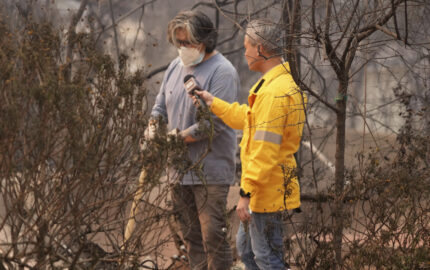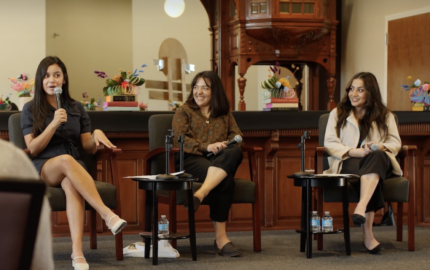
Medical Reporting
“The chasm between medical journalists and physicians appears mostly to be one of ignorance rather than conflicting interests or malice,” writes Terry L. Schraeder, who for 10 years worked as a medical journalist before entering medical school. Now doing her residency in internal medicine, she uses these experiences to highlight the problems between journalists and doctors and ways to close the widening gap of distrust. She is convinced that only when they “understand the other’s professional training, education, deadlines, responsibilities, codes of ethics, and internal stresses” will the chasm narrow. – Melissa Ludtke, Editor
Is it possible for truth to exist in journalism? This question resides at the core of “The Press Effect: Politicians and the Stories That Shape the Political World,” a book written by Kathleen Hall Jamieson and Paul Waldman. Seth Effron, who for 18 years reported on politics in and around North Carolina, reflects on how the analysis and conclusions contained in this book apply to current political coverage. In doing so, he relives President Bush’s telegenic landing on the USS Abraham Lincoln and wonders why aspects of “truth” didn’t surface in the political coverage of that event. He also comes up with a few good questions that most in the press never asked.
Mike Riley, editor of The Roanoke (Va.) Times, provides a close-up view of Eric Alterman’s book, “What Liberal Media? The Truth About Bias and the News,” but he also looks behind the words—liberal and conservative—that are tossed around in media food fights. Riley writes about how all of this affects journalists: “Journalists are held hostage by the power of labels. We, the labelers, have become the labeled, and we’re trapped by the ways in which people perceive the words ‘conservative’ and ‘liberal.’ That’s a terrible predicament for people who fancy themselves as independent observers.”
Media companies believed in the Internet as a profit-making enterprise. And then they lost billions of dollars before abandoning this belief. In “Bamboozled at the Revolution: How Big Media Lost Billions in the Battle for the Internet,” John Motavalli chronicles the many difficulties big media companies have had trying to develop new media strategies. In reflecting on Motavalli’s book, David DeJean, a former newspaper reporter who works with computers and communication technologies, wishes the author had focused less on intricacies of corporate deal-making and more on whether what media companies produce really have a profitable place on the Internet. For readers who want to understand the disconnect between media content and the Internet as its vehicle, DeJean recommends “Small Pieces Loosely Joined,” a book by David Weinberger.
Bill Wheatley, vice president of news at NBC, walks us through the 40-year reporting career of CBS News’s Bob Schieffer, who is now moderator and commentator of “Face the Nation.” He bases his account on Schieffer’s memoir, “This Just In: What I Couldn’t Tell You on TV,” in which he quotes Schieffer as saying he has “always wanted to see things for myself and make my own judgments about them.” During his career, Schieffer reported on the forced integration of the University of Mississippi, President Kennedy’s assassination, the Vietnam War, and from the White House, Pentagon, Congress and the State Department. As Wheatley writes, “One doesn’t get to hold the jobs Schieffer has … without being journalistically aggressive, to say nothing of being good at what you do.”
Mike Riley, editor of The Roanoke (Va.) Times, provides a close-up view of Eric Alterman’s book, “What Liberal Media? The Truth About Bias and the News,” but he also looks behind the words—liberal and conservative—that are tossed around in media food fights. Riley writes about how all of this affects journalists: “Journalists are held hostage by the power of labels. We, the labelers, have become the labeled, and we’re trapped by the ways in which people perceive the words ‘conservative’ and ‘liberal.’ That’s a terrible predicament for people who fancy themselves as independent observers.”
Media companies believed in the Internet as a profit-making enterprise. And then they lost billions of dollars before abandoning this belief. In “Bamboozled at the Revolution: How Big Media Lost Billions in the Battle for the Internet,” John Motavalli chronicles the many difficulties big media companies have had trying to develop new media strategies. In reflecting on Motavalli’s book, David DeJean, a former newspaper reporter who works with computers and communication technologies, wishes the author had focused less on intricacies of corporate deal-making and more on whether what media companies produce really have a profitable place on the Internet. For readers who want to understand the disconnect between media content and the Internet as its vehicle, DeJean recommends “Small Pieces Loosely Joined,” a book by David Weinberger.
Bill Wheatley, vice president of news at NBC, walks us through the 40-year reporting career of CBS News’s Bob Schieffer, who is now moderator and commentator of “Face the Nation.” He bases his account on Schieffer’s memoir, “This Just In: What I Couldn’t Tell You on TV,” in which he quotes Schieffer as saying he has “always wanted to see things for myself and make my own judgments about them.” During his career, Schieffer reported on the forced integration of the University of Mississippi, President Kennedy’s assassination, the Vietnam War, and from the White House, Pentagon, Congress and the State Department. As Wheatley writes, “One doesn’t get to hold the jobs Schieffer has … without being journalistically aggressive, to say nothing of being good at what you do.”


